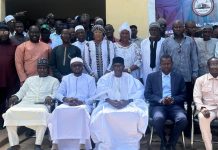By Kebba AF Touray
Gambian authorities and their Senegalese counterparts have agreed to address issues affecting transit traders, such as the exorbitant and unnecessary charges and delays that traders from the two countries are faced with.
This development is contained in a report developed by the Trade Committee of the Gambian Parliament after they visited Senegal for discussions on the issues affecting trade between the two states.
One of such issues highlighted in the report is the payment of exorbitant escort charges which traders are obliged to pay to avert unnecessary delay at borders.
The report of the committee which was laid before the plenary on Thursday, 12 September 2024, by the Chairperson of the committee, Hon. Kebba Jallow spoke about their visit to the Senegalese Parliament for trade facilitation.
According to the report, the National Assembly is responsible for performing oversight of the activities of the Trade Ministry and its satellite institutions or agencies.
“This mandate is vested on the committee by the National Assembly under Section 109 of the 1997 Constitution and Standing Order 97. In addition, the committee has the power under Section 109 subsection 2 (B), to investigate any matter of public interest,” Hon. Jallow said, reminding his colleagues that during the Fifth Legislature, the committee embarked on a countrywide tour, to both official and unofficial border posts, to assess and generate firsthand information on the implementation of the ECOWAS Protocol and Conventions for the transit of goods across the country’s borders.
“In this regard, GRA officials informed the committee that their Senegalese counterparts do not implement the ECOWAS Inter State Road Transit Convention (ISRT),” he said.
Furthermore, he said the committee of the current Legislature engaged the GRA to enquire about the state of implementation of the ISRT by their Senegalese Counterparts.
The committee, he said, was informed that the situation remains the same, “because their counterparts are not implementing this convention.”
Following this information, he said the committee learned that transit goods from the Gambia are being charged prohibitive or double escort fees, to the extent of making “transit trade in the Gambia unattractive, which in turn affects custom revenue”.
“In the same vein, the Gambian traders in transit trade across the border expressed similar concern,” he said.
He said it is against this backdrop that the committee embarked on a visit to Senegal to meet their counterparts and other relevant authorities as part of their efforts to facilitate an easy and speedy movement of goods in transit by honoring the ISRT Convention and other trade agreements.
During the visit, he said they met with Senegalese authorities such as the Director General of Duane, the Committees on Economic Affair and Foreign Affairs and African Integration, and the parliamentary committee in charge of Senegalese abroad.
“The authorities emphasized the importance of the visit as the two states are inseparable and share the same people, culture, social values, and economic activities among others,” he said. He reiterated among others “that the bond between the Gambia and Senegal makes the countries as one, only to be divided by the West for their own interest.”
He said members of the Gambia’s Trade Committee highlighted the need for collaboration between the two states, as they are all part of ECOWAS and subjected to the convention and protocols of the regional bloc.
“The Gambian delegation informed their Senegalese counterparts that the non-trade barriers that transit traders experience from one border to another is exorbitant and therefore there is a need for dialogue to address these challenges,” he said.
He said customs officials on the borders subject transit traders to unnecessary charges that contravene the provisions of the ISRT Convention “by imposing unnecessary and multiple escort fees, leaving the traders without choice but to pay, to avert unnecessary delay.”
The Gambian delegation, he said, told their Senegalese counterparts that the proper implementation of the convention is beneficial to the two states and therefore the need for them to come together for the smooth implementation of the convention.
After the meeting, he said the authorities of the two states agreed to dedicate their efforts to engage all the relevant authorities in their respective countries on the matter; and to ensure that trade and other border-related issues are addressed.
He said both committees also agreed on the need for serious sensitization on the agreement between the two countries, and the importance of implementing the convention’s protocols and to the citizens of the two states on the need to integrate the two countries’ telecommunication systems so that there will be no need to swap sim cards if citizens visit either country; adding that they agreed to engage the committees responsible for telecommunications, to enhance the integration of the two states.
He said they agreed on the need for the Senegalese parliament to establish a trade committee because currently, the Senegalese parliament does not have a dedicated committee on trade. He said the two committees agreed for their parliaments, customs, and executives to address the issues of NBT.
He said the Committee recommended that both countries establish a juxtaposed customs office on both sides of the border to facilitate a coordinated management of control operations and the handling of goods and services.
“There is a need to interconnect the two countries’ customs IT systems (GAINDE and ASYCUDA) in order to harmonize procedures and thus solve the problem of transit documents. The committee also recommended that GRA through the relevant Ministry, engage ECOWAS to operationalize the Interconnected System for the Management of Goods in Transit (SIGMAT) between the two countries,” he said.
At the end of a brief debate, Members of the Assembly subsequently adopted the report of the Trade Committee on their trade facilitation visit to their Senegalese counterparts.




















